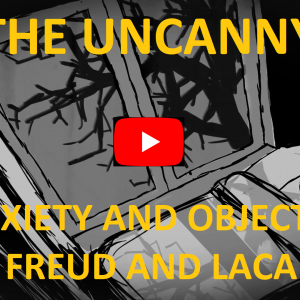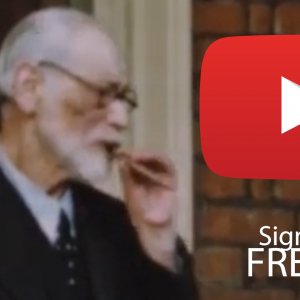Reading Lacan – Where to Start?
A few people have contacted me recently via this site asking for suggestions of what to read, either by way of introduction to Lacan or for an alternative perspective on his work. The list below are some of the titles I usually recommend to them. By adding it to the site it will hopefully help others with the same question, but it is by no means an exhaustive list, and represents my own opinions only, so feel free to add your own recommendations in the comments section below.
For those curious, the image above dates from 1874 and depicts delegates of the Congress of Orientalists inspecting the Rosetta Stone, the key to the deciphering of Egyptian hieroglyphs. In the first text I recommend below, Lacan compares Freud as pioneer not to Christopher Columbus, as has often been suggested, but to Jean-François Champollion who in 1822 published the first translation of the Rosetta Stone.
Gentle Introductions to Lacan
- As the Écrits are famous for being somewhat gruelling, and the Seminars sometimes very long-winded, I would recommend the uninitiated or simply curious investigator start with the interview Lacan gave to the French news weekly L’Express in 1957. The interview has value beyond its conciseness. According to Roudinesco’s biography, the interviewer insisted that Lacan agree to the condition that he speak as if to a lay audience, and avoid the kinds of highfalutin rhetoric he was already becoming infamous for. You can find a copy of the interview here.
- If the reader is not familiar with it already, Darian Leader’s Introducing Lacan
is a deceptively simple but masterly piece of compression, providing a great taste of the old man’s very tricky ideas with verve, wit and crystal clarity.
- And so to Zizek – probably the world’s most well-known Lacanian, his name is now so closely associated with Lacan in the popular mind that it would be stupid to neglect him on a list like this. I would recommend anything by the ‘earlier period’ Zizek, but especially The Sublime Object of Ideology
and Looking Awry: An Introduction to Jacques Lacan through Popular Culture
. Whilst he divides opinion amongst Lacanians, these two works in particular are a pleasure to read. Zizek has not always been as well-known as he is now, and an amusing story about how he first emerged on the scene is worth recounting. In the early nineties, in the wake of the Sokal and Bricmont affair, there was great suspicion across academia of anyone purporting to talk with authority about continental philosophy. When a hyperactive, bearded Slovenian philosopher with what seemed to be a made-up name emerged on the scene with a book entitled Everything You Always Wanted to Know About Lacan (But Were Afraid to Ask Hitchcock)
many academics, wary of being duped again, believed this was another hoax and refused to take it seriously. An astonishing beginning for a man who has introduced so many readers to Lacan’s work! In his more recent work, Zizek’s own introduction to Lacan, the cheekily-titled ‘How to Read Lacan’ is highly recommended, and what’s more, you can read the full book for free at Lacan.com here.
- Translator of Lacan’s Écrits Bruce Fink has authored a number of great books on Lacan. His ‘The Lacanian Subject’ provides perhaps one of the best introductions to Lacan’s thought, written with great clarity and (mercifully) without pretension.
- Another introduction to Lacan’s work that must get frequently overlooked, perhaps on account of its title, is Van Haute’s ‘Against Adaptation’. Strictly speaking it is, according to its subtitle, an introduction to Lacan’s paper ‘Subversion of the Subject’, but the ground it covers is much wider, and Van Haute does a great job bridging Freud’s thought with Lacan’s.
- Finally, as one of Lacan’s former students, Moustafa Safouan’s slim volume Four Lessons of Psychoanalysis
is another easily-digestible introductory work.
Gentle Introductions to Freud
- A reader of Lacan is a reader of Freud, and there’s nothing like the man himself to provide the best introduction to his own work. The Introductory Lectures on Psychoanalysis
and New Introductory Lectures on Psycho-Analysis
, from two very different periods of his work, make fascinating reading side-by-side and give a great overview of what he considers to be the most important of his discoveries in each period. Freud’s method of introduction to psychoanalysis (repeated in The Question of Lay Analysis
), of pre-empting and responding to the criticisms that sceptics are likely to make against his thought, give the first-time reader a brilliant way to approach his work.
- Whilst ‘The Interpretation of Dreams’ remains his definitive masterwork, On Dreams
– a more condensed and accessible paper introducing his dream theory – provides a less punishing introduction than the hefty full book itself.
- Going beyond these introductory texts from Freud’s own hand, anyone new to his work could do worse than follow these with his Papers on Metapsychology
, from the middle-Freud period, which offer an introduction to the theory of psychoanalysis. And at the same time, and from around the same period, his so-called ‘technical papers’ on the technique and practice of psychoanalysis will provide a good accompaniment to round-out the theory.
- Some other authors also provide great introductions to Freud’s work. I would particularly recommend the late Richard Woolheim’s Freud
for a solid general overview. Whilst not a Lacanian exposition, Jean-Michel Quinodoz’s Reading Freud: A Chronological Exploration of Freud’s Writings
– the result of many years’ laborious seminar work with his students – will provide the reader with a paper-by-paper analysis of Freud’s key texts, with commentary situating the issues explored by each in modern-day psychoanalysis, and historical notes on the cultural and institutional background these works sprang from.
Taking Things Further
- To take your reading a bit further, there are some great works on psychoanalysis by non-Lacanians. I would certainly recommend Mikkel Borch-Jacobsen’s Lacan: The Absolute Master
as a more ‘advanced’ introduction to Lacan’s work.
- Jean Laplanche is to my mind one of the very few analysts who can give Lacan a run for his money when it comes to the reading of Freud. He’s not as creative a thinker as Lacan, but his work has extraordinary rigour and clarity. His series of lectures are published in French as the Problematiques. I am only aware of a single English translation of this series, The Unconscious and the Id
, but I cannot recommend this highly enough if you’ve grasped the rudiments of Freud and want to get deeper into psychoanalytic theory. It is also interested to compare Laplanche’s style of delivery (the Problematiques were given as a series of lectures) to Lacan’s more animated, idiosyncratic, method of exposition. A more systematic exposition of the ideas in the Problematiques can be found in his New Foundations for Psychoanalysis
.
- Finally, one of Lacan’s contemporaries, the philosopher Paul Ricoeur, also writes the excellent Freud and Philosophy: An Essay on Interpretation
, which is worth checking out too. Lacan was apparently angered by its appearance in 1970, at a time when Lacan dominated the French psychoanalytical scene. Turning to the index it will be noted that Lacan’s name appears only in footnotes, with the exception of one dismissive reference to Lacan owing the idea of the unconscious structured like a language from Merleau-Ponty. This might explain Lacan’s irritation.
Clinical Perspectives
- People used to complain about the deficit of available clinical material published by Lacanian psychoanalysts. In the last ten to fifteen years that has changed greatly. There are a handful of general clinical introductions worth checking out. Fink has published two: Fundamentals of Psychoanalytic Technique
and A Clinical Introduction to Lacanian Psychoanalysis
. Philip Hill has a larger volume called Using Lacanian Clinical Techniques
, and more recently, a highlight from last year, Michael J. Miller’s Lacanian Psychotherapy: Theory and Practical Applications
is also highly recommended. Paul Verhaeghe’s On Being Normal and Other Disorders: A Manual for Clinical Psychodiagnostics
does a good job of situating Lacanian psychoanalysis within the wider context of modern mental health treatments, and engaging with them on terms that are their own.
- On more specific areas of symptomatology, three books by the aforementioned Darian Leader are worth checking out: What Is Madness?
on psychosis; The New Black: Mourning, Melancholia, and Depression
on depression; and Why People Get Sick: Exploring the Mind-Body Connection
on psychosomatic disturbances.
- Outside the Lacanian world, I would recommend the Edward Glover’s 1955 The Technique of Psycho-Analysis
, and the classic from former IPA president Horacio Etchegoyen, The Fundamentals of Psychoanalytic Technique
. This should give any reader an idea of how different analysts from various orientations and across the generations have approached clinical problems.
- Finally, an alternative view comes from Mikkel Borch-Jacobsen, more recently infamous to psychoanalysts as one of the co-authors of the French-only ‘The Black Book of Psychoanalysis’, which caused quite a stir when it was released and has contributed to the current parlous standing of psychoanalysis even in France. I would strongly recommend two of his books, Making Minds and Madness: From Hysteria to Depression
and Remembering Anna O.: A Century of Mystification
, both of which are written in a crystal-clear, easy-to-read style and provide, in my opinion, the most fascinating food for thought for those susceptible to the so-called ‘Cult of Lacan’. Everyone should read Lacan with a healthy skepticism, and Borch-Jacobsen’s work provides the best antidote.
Lighter Reading
- Darian Leader’s Why Do Women Write More Letters Than They Send?: A Meditation on the Loneliness of the Sexes
and Promises Lovers Make When It Gets Late
are both very accessible, pop-culture examples (in the best sense of the term) of Lacan’s theories applied to everyday life. Verhaeghe’s Love in a Time of Loneliness: Three Essays on Drive and Desire
was published a couple of years after these and is also both excellent and accessible. An older example in this vein is Sapirstein’s Paradoxes of Everyday Life
from 1955 (if you can get your hands on it).
- Coming back to the present, Henry Bond’s Lacan at the Scene
builds on a brilliant premise: imagining how Lacan would interpret crime scenes in the UK through the 1950s and 1960s. I reviewed the book for this edition of Palgrave’s ‘Psychoanalysis, Culture and Society’.
Psychoanalytical Reference Works
- To help the reader of Lacan through all the psychoanalytic jargon littering the field (and there is plenty!) there are two reference works I would consider absolutely indispensible. First, from a Lacanian perspective, Dylan Evans’ An Introductory Dictionary of Lacanian Psychoanalysis
– a terrific accomplishment unrivaled to this day – and second, from a more general psychoanalytic perspective, Laplanche and Pontalis’ The Language of Psycho-Analysis
. The latter has sat on every psychoanalyst’s bookshelf since the 1960s.
As mentioned above, this is by no means an exhaustive list – feel free to add your own recommendations in the comments below.
By Owen Hewitson, LacanOnline.com




Interesting and extensive list, thanks. I certainly think Darian Leader’s books are a good introduction.
I am often visiting lacanonline.com and I was delighted to find your list today. As I expected it is a extense list, although some of the titles like Bruce Fink and ZiZek I already was into, so it reduces a little my further reading.
Thank you so much, it is good to know there is a space where we can find precise and reliable Lacanian info.
Grace
You forgot to mention a book which was advised by Jacques derrida and Jacques lacan himself. The Title Of The Letter.
Wait, so at no point should I read Lacan’s actual work? Kidding of course. But this list just offers dozens of books about Lacan, without saying what works by Lacan should be read, and in what order!
Basically to understand and read Lacan, this list recommends not reading Lacan.
uh what about books by Lacan
See above – “As the Écrits are famous for being somewhat gruelling, and the Seminars sometimes very long-winded, I would recommend….”
Écrits – https://amzn.to/2GBzYyj
Seminar – http://www.lacaninireland.com/web/translations/seminars/
Email me if you need more – contact@lacanonline.com
please recommend 2-3 seminars that are best to start with. thanks!
Personal favourites: Seminar V, Seminar II, Seminar XI, in that order. All available here: http://www.lacaninireland.com/web/translations/seminars/. Have fun!
I don’t know if you have come across this book, but Karen Coats provides a very accessible introduction to Lacan’s ideas and their application to children’s literature in Looking Glasses and Neverlands: Lacan, Desire, and Subjectivity in Children’s Literature.
https://www.jstor.org/stable/j.ctt20q1xw7
thank you very much for the advice re: S5, S2 and S11 in that order. would you care to say some words about each of these and why specifically in this order? i think your response will be important and might be worth it to append to the main text. is there a reason you kept lacan himself out of this list? perhaps you plan to write a separate article for how to dive in to lacan himself? (see marcelle marini’s lacan: the french context for an excellent synopsis of each and every work.)
one more thing: some of your videos have a full essay to complement them. have you thought of writing a post to accompany the new video on dreams and the freudian unconscious? that would be a real treat. any any rate, thanks for your work in text and in video. it’s endlessly helpful, clearly articulated and so thorough.
Hi! Ive been reading tons of secondary literature (all you have mentioned and then some) and i still have an issue grasping lacan. Would you recommend reading seminar XI and reading seminars I and II?
* i mean the books “Reading seminar XI” and “Reading seminar I and II”
Yes
Hi! I want to share a book i discovered on Lacan which I think is the best introduction to his work by far. I have read most of the books on your list and, while good, they sometimes tend to either dumb-down or occasionally obfuscate even more. The book is called Freud as philosopher: metapsychology after Lacan by Boothby. After reading it everything clicked in place. The book engages with the philosophers which inspired lacan and tracks his ideas very patiently, while also going into quite a lot of detail. If you do not know it, please check it out, since i think it definitely should be on the list. If you do know it, is there a reason it isnt put in?
Can anyone recommend secondary sources dealing specifically with “The Insistence of the Letter in the Unconscious “? Thank you!
The link to the interviews first mentioned no longer work. Can you post them somewhere or send to me?
New link to the 1957 interview with L’Express, the first item in the list above: https://www.lacanonline.com/wp-content/uploads/2019/10/Interview-with-Jacques-Lacan-LExpress-1957.pdf
Thanks Ben – have updated the link in the text itself.